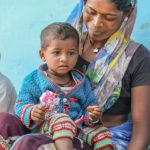
ARE DATA AVAILABLE FOR TRACKING PROGRESS ON NUTRITION POLICIES AND PROGRAMS IN SOUTH ASIA?
The South Asian countries (Afghanistan, Bangladesh, Bhutan, India, Maldives, Nepal, Pakistan, Sri Lanka) have endorsed the 2030 global nutrition targets of Sustainable Development Goal 2 (SDG 2). Efforts are underway in the region to implement global recommendations on nutrition actions to address all forms of malnutrition along the life-course. Despite these efforts, the South Asia region continues to have the highest burden of malnutrition in the world, with 53.8 million (33.2 percent) stunted children under 5 years and progress in accelerating nutrition actions is uneven both across and within countries in the region. (GNR 2020).
As South Asian countries implement multi-sector and multi-stakeholder plans to address the multiple causes of poor nutrition, the regular review of policy and program alignment and monitoring of coverage of nutrition actions through national data systems, is important to support evidence-based decision making and to ensure policies are consistent and effective. To this end, the International Food Policy Research Institute’s (IFPRI) South Asia Office, in collaboration with the UNICEF Regional Office for South Asia (ROSA) and others, examined the alignment of national nutrition policies and programs with global recommendations, and assessed the availability of data to track progress on nutrition actions across the eight South Asian countries.
First, we developed a base framework of recommended nutrition actions from normative global guidelines. For each country, we identified applicable* nutrition actions based on country nutrition context. We then reviewed nutrition-relevant national/state-level policies, and program implementation operational guidelines to identify policy and programme gaps. To assess the availability of data to track progress, we reviewed questionnaires of population-based household surveys in each country, to assess the extent to which the nutrition actions are tracked across surveys. We also reviewed the availability of indicators to track implementation of select high impact nutrition actions recommended by the Lancet and Essential Nutrition Actions by the World Health Organization (WHO) through routine administrative data systems and identified gaps across the eight countries.
What we found
In all eight countries in the region, national policies and plans were found to address most of the globally recommended nutrition actions, but there were policy and program gaps in addressing some of these actions. Our findings suggest that program gaps are wider than policy gaps in the region. Gaps in program implementation are of concern as they point to shortcomings in translation of policy intents to actual delivery of the recommended nutrition actions. Policy and program gaps were more pronounced in the preconception and early childhood life course stages compared to adolescence, pregnancy, and delivery and postpartum period.
We also found that population-based surveys collected limited data to track the coverage of nutrition actions in national policies and programs. The data gap was more than 50 percent in five countries (Afghanistan, Bangladesh, Bhutan, Maldives, and Pakistan) (Figure 1). This implies that coverage of about half the available nutrition actions cannot be tracked using data from population-based surveys. Even in India and Nepal, countries wherein data gaps are the smallest, data was not available for 18 out of 51 (India) and 21 out of 50 nutrition actions (Nepal).
Figure 1: Policy, program and data gaps for applicable nutrition actions in South Asian countries
Note: Policy gap is the number of recommended and applicable nutrition actions not addressed by policies, plans, or strategies. Program gap is the number of actions addressed by policies but not by programs, or by both. Data gap is the number of applicable nutrition actions for which data was not available in the nationally representative population-based surveys. The numbers in the bars are the count of nutrition actions.
Overall, our research signals the need to support decisions aimed at closing policy and data gaps in existing policies and nutrition information systems in the region. Our findings call on the nutrition community in South Asian countries to identify opportunities to strengthen nutrition data collection in population-based surveys and administrative systems which are critical to improving tracking progress of essential nutrition actions. In view of the protracted COVID19 pandemic and its likely impact on diet, nutrition services, and practices, there is a need to scale-up the essential nutrition actions to address all forms of malnutrition.
We have organized the knowledge products in the form of regional brief and country reports.
The regional brief summarizes the methods and policy and program gaps in addressing nutrition actions and data gaps in population-based surveys in all the countries in the South Asia region—Afghanistan, Bangladesh, Bhutan, India, Maldives Nepal, Pakistan, and Sri Lanka.
The country reports summarize review findings with two key objectives: 1) To assess the extent to which existing country-level policies and programs a) address the recommended nutrition actions across the life-course; b) recognize both immediate and underlying determinants of nutrition; c) aim to tackle the key relevant nutrition outcomes, and 2) To examine the availability of data to track progress on nutrition actions, determinants, and outcomes.
This blog was originally published in the Data for Decisions to Expand Nutrition Transformation (DataDENT) website here.
Manita Jangid & Sumanta Neupane are Program Managers with IFPRI’s Poverty, Health and Nutrition Division and are based with IFPRI’s South Asia Office; Zivai Murira is a Nutrition Specialist with UNICEF Regional Office for South Asia.


